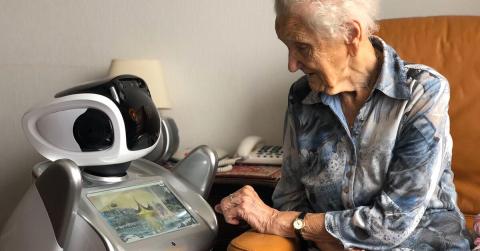The robot assistant developed and commercialised by SARA Robotics improves the quality of life of elderly residents, eases their longing for social contacts and reduces the staff's workload.
"Social & Autonomous Robotic Health Assistant" or SARA Robot for short was developed as a innovation activity of EIT Digital, led by Bright Cape.
In ageing European societies, the number of elderly people as a percentage of the overall population is constantly increasing, while fewer and fewer people choose to become healthcare professionals. Care institutions and hospitals, therefore, are facing serious staffing shortages and heavy work pressure has proven to be related to poor quality of care and to incidents such as medication errors.
The robotics assistants developed as a result of this EIT Digital innovation activity and commercialised by SARA Robotics provide a turnkey hardware and software solution for care institutions and hospitals to improve care recipients' quality of life and provide support to alleviate caregiver-staffing shortages. For instance, the SARA robot can support elderly people suffering from first-stage dementia to perform specific exercises designed to improve their mental and physical fitness and delay entering the second, more acute stage of the illness.
The robot can also play games, support music therapy and perform repetitive tasks, such as reminding staff and clients of certain events and checking the client's wellbeing.
The COVID-19 pandemic shone a spotlight on the wellbeing of elderly guests of nursing homes, the shortage of staffing and growing demand of resources and services. As a result, there, its services are in growing demand. The start-up also set up a promotional campaign, "SARA stays over" (SARA blijft slapen), allowing care institutions to borrow the robots for free for one month, to get some support out of it and test its functionalities.
As visitors were no longer allowed in those institutions, we had a lot of requests, from our customers but also from other facilities, asking if it was possible to use the robot to help clients have some form of communication with their friends and relatives. So, we built the option to video call via SARA and we also explored more options such as the uploading of pre-made videos or photos which can be viewed by residents at any time, even without an Internet connection. We just wanted to do something good for the residents of those facilities and, at the same time, it was a nice opportunity for us to showcase our innovation and see if these care homes would be interested to pursue a longer collaboration,
Emmy Hendriks, Product Manager of SARA Robotics
For now, SARA Robotics aims at commercialising the product almost exclusively on the Dutch market. Starting next year, the startup will expand its reach by enabling different kinds of robot hardware systems to run the SARA software, and it will try to enter the European and the United States markets.
SARA Robotics benefited from the EIT Crisis Response Initiative with EUR 400 000 support from EIT Digital. Most recently, SARA Robotics announced a fundraising round of 350 000 EUR to further develop the robot in collaboration with healthcare institutions. With the received support, several functionalities were added to SARA including a system called SARA Home, accessible from a computer or tablet, nurses can elaborate a personalized profile and health plan for every resident, meant to support the caregiver. In its current form, the robot can play games, support music therapy and perform repetitive tasks, such as reminding staff of certain events and checking on the resident’s wellbeing.


 Share this page
Share this page


